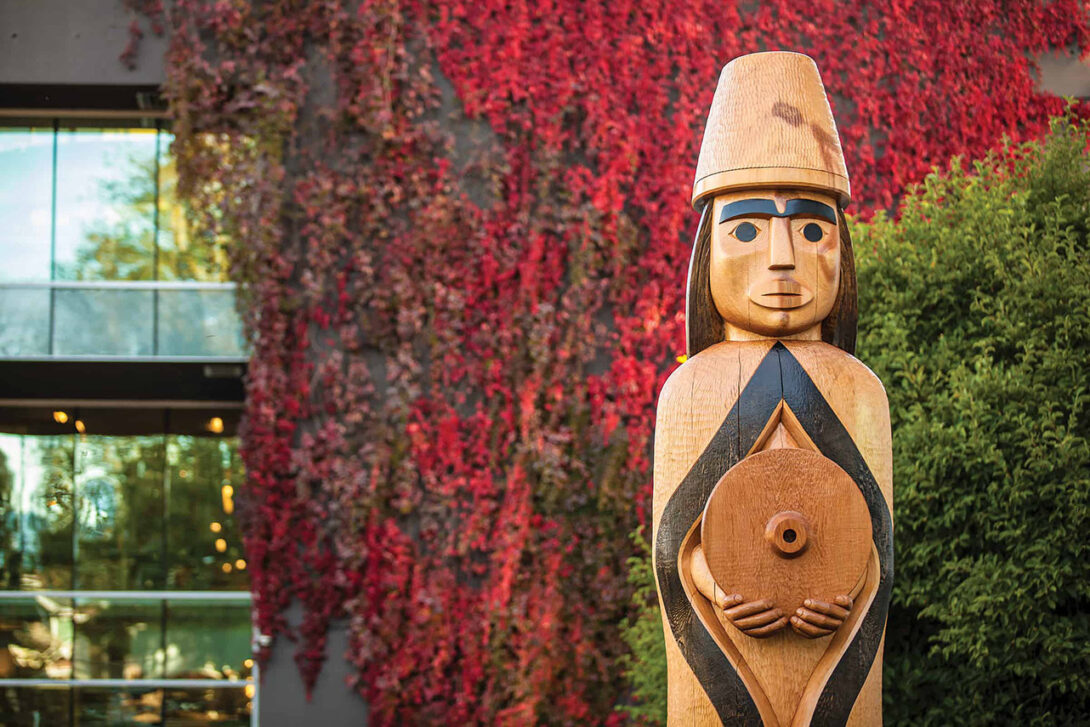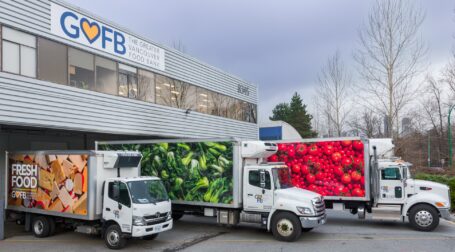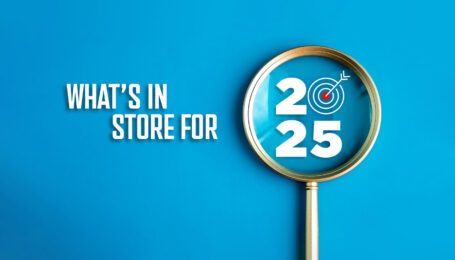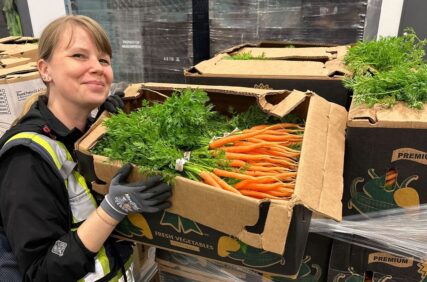
The Musqueam house post at Langara welcomes visitors to the traditional unceded territory of the Musqueam People. (Credit: Langara College)
Musqueam student Karen Dan fulfills a family wish
Karen Dan, 60, is a residential school survivor and driven by the memory of her late mother’s wish: to see her graduate from high school. After seven years of residential elementary school, and without her mother’s support, Karen never graduated.
 “Back then, if you didn’t pass your class, they kept you back,” recalls Karen. “If you’re kept back, they decide you’re special’ and put you in a special’ class for unteachable students’. A lot of First Nations kids would go to these programs. You get stuck in a program that is not where you’re actually at as a student.”
“Back then, if you didn’t pass your class, they kept you back,” recalls Karen. “If you’re kept back, they decide you’re special’ and put you in a special’ class for unteachable students’. A lot of First Nations kids would go to these programs. You get stuck in a program that is not where you’re actually at as a student.”
Due to various work and family commitments, Karen was unable to continue her education. In October 2019, over 40 years later, Karen enrolled in Langara’s Indigenous Upgrading Program (IUP), a joint project between Langara College and Musqueam to help non-graduated adults in the Musqueam community complete their adult Dogwood diploma and connect to further education or career opportunities. The program prepares students academically, building the soft skills needed to facilitate their successful transition to post-secondary studies while incorporating Musqueam knowledge, learning, and teaching methods. The IUP launched in May 2019, funded by the Social Sciences and Humanities Research Council (SSHRC), a contribution from the RBC Foundation, the Langara College Foundation, and additional funding support from a family foundation.
“I thought that I couldn’t do it, given what I was told at such a young age at residential school,” Karen says. “That was really challenging. But the IUP instructors gave me all the confidence in the world that I could do this. All my doubts went out the window.”
Since the beginning of the COVID-19 pandemic, Karen has shifted to online learning that facilitates her schedule and multiple jobs. She is the first graduate of the program, completing her British Columbia Adult Graduation Diploma (BCAGD) through program partner Vancouver Learning Network (VLN). Despite the challenges, she plans to forge ahead with her education and study social work at the post-secondary level.

The Langara College Foundation receives a cheque from the RBC Foundation in support of the Indigenous Upgrading Program. (Credit: Langara College)
“For me, this is a huge accomplishment, because my late mother instilled in me the desire to see her children graduate,” Karen says. “She may be gone, but these words have been stuck in my head for over forty years. I went back to school because of her. For me to actually get there, it’s huge. When I look at where I come from, always thinking I was so unteachable, and yet here I am today, at my age, being teachable. It’s an achievement because I’m defying what the government had instilled in me.”
IUP instructors offer one-on-one support in line with the students’ goals with a focus on academic subjects such as English and Math. Students often take English First Peoples 12 through VLN to complete their high school English requirement; some students have literacy needs while others are strong writers. Students need to pass Math 11 to graduate, so instructors provide math support as many are beginning in the elementary grades.
“I was afraid in the beginning, but I overcame it,” Karen says. “Even through life challenges, we can do it. We just set our mind to reaching for those stars and never doubt ourselves. I think that’s one of my biggest things – I’m always doubting I can do it. But the instructors tell me, No, Karen, you can do this.'”
Learn more about how our students, employees, and alumni continue to engage in innovative and sustainable community projects during this challenging time at langara.ca/communitystories.
Connect:
Facebook | Twitter | Instagram | LinkedIn







